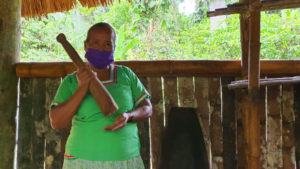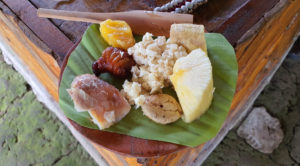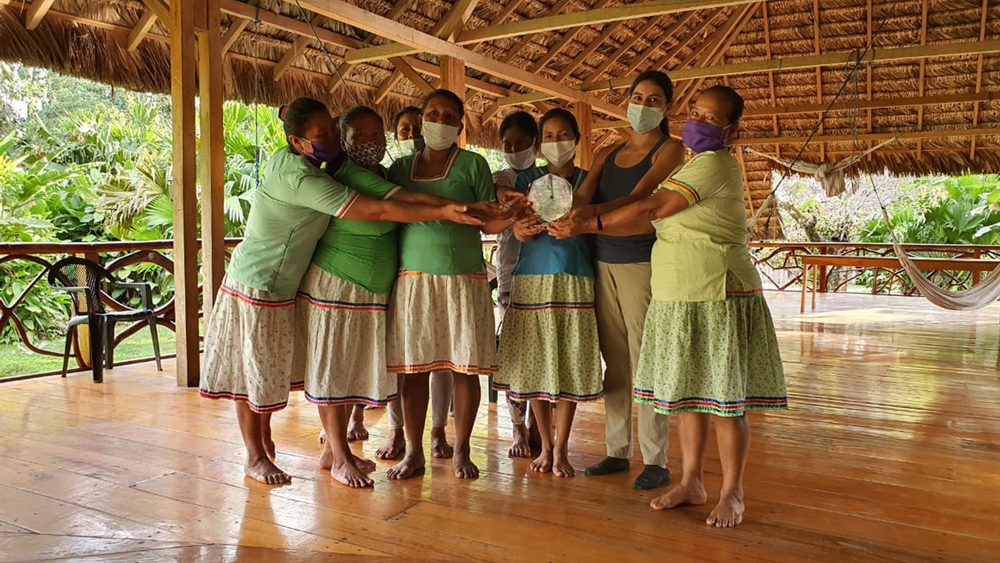The smell of guayusa fills the air of the hut and visitors, one by one, they take their places inside the building made with native chonta wood and the leaves of local palms on the roof. The women of the community with their traditional clothes approach the tourists and give them a pilche with hot tea to drink. The sound of the jungle, birds, amphibians and insects floods the place, combining with the Kichwa songs that welcome the Amazon community of El Pilchi in the province of Sucumbíos.
This traditional reception is part of the cultural tourism experience offered by the women of the community through the Mandi Wasi community project. However, as Nidia Rivadeneira, president of the community, recalls, this was not always the case.
“Before, the community was dedicated only to agriculture and the forests were cut down, and when the crops were exhausted, only more was cut down… but we, the Kichwas, do not like to deforest the forest, we like to breathe pure air and take care of nature because it gives us life, it is our pharmacy and where we get our food.”
In order to take care of their forest, Nidia, who has lived in El Pilchi for almost 35 years, recalls that the community decided to stop logging and embark on a sustainable project that would provide them with a source of income and reduce the progress of deforestation and forest degradation in Yasuní’s buffer zone.

Photograph: UN Women (Archive images)
Description: Groups of women who have participated in workshops on gender inclusion
The Kichwa El Pilchi Community is located in Sucumbíos, in the Shushufindi canton, Limoncocha parish, on the banks of the Napo River. The total area of the territory is 8,990 hectares (ha), of which 5,681.44 ha are under a conservation agreement with the Socio Bosque Project [1]. The community is made up of approximately 230 people and decision-making takes place during the general assemblies.
Within the community, men and women were organized to form two entrepreneurships: the Mandi Forest-El Pilchi Lodge Association (men) and the Mandi Wasi Association (women), to offer the experience of community tourism.
Nidia was one of the women who initiated the Mandi Wasi project, which means house and mandi, the local name for the lechuguinos that float in the lagoon of the same name, Mandi Cocha. This entrepreneurship started in 2015 but officially started operations in 2017; through an alliance with an inn on the shore of the lagoon.
“For us Kichwas it is important to maintain our way of life, our culture, our gastronomy and to maintain the forest, that is why the project was born, to preserve our territory for future generations,” adds Nidia, who at 65 years of age now leads the initiative and is president of the community.
The project offers an immersion experience in the Kichwa culture, fascinating for its gastronomy, ancestral knowledge and traditions. About 20 women from the community, including Nidia, work in four groups of five women that rotate every eight days.
“We make handicrafts, we prepare yucca, palm heart maito and fish, we hike in the chakra and the community, we show them about medicines, seeds and share our knowledge of the jungle,” mentions Nidia.
The income generated is distributed among the members, and women who do not want to be part of the project directly can still sell their handicrafts through the initiative. “The benefits are being obtained directly by us, the women, as it is a community project,” she adds. Every four months, the members distribute a bonus of 100 USD to each of the 20 women, which motivates the families to be part of the project.
Nidia feels that this idea was born from women because of their daily contact with the land. For the Amazonian entrepreneur, the relationship with the chakra, the forest and the spirits of the Pachamama mean that “women have a special role in taking care of the earth, nature, water, the jungle and the plants that give us life.”
But for Nidia, the work continues; the need for training to provide a better service is what led her to seek support from PROAmazonía, a program of the Ministry of Environment, Water and Ecological Transition and the Ministry of Agriculture and Livestock, implemented by UNDP. Together with Mandi Forest, the Mandi Wasi partners took part in the training workshops with the Starting With Your Business (ICSN) methodology that began in 2019 and ended in mid-2021.
Through this initiative, the company was supported in improving its administrative and commercial capabilities. Trainings were given on basic principles of computing and technology, design of utilitarian crafts and costume jewelery, and finance and market workshops. PROAmazonía will also deliver a solar battery to improve the tourist services provided by the community.
“We want to continue to prepare ourselves with more knowledge. Many of the women do not know how to read or write, but with hard work and practice they have achieved a lot and for the future I would like the young people to prepare themselves more: learn English, form a solid company, and have a cultural center,” says Nidia.

Photograph: Jorge Idrovo
Description: A traditional dish made by the women of Mandi Wasi, in which yucca,
maito, maduro, palm heart among other traditional ingredients stand out.
[1] The Socio Bosque Project (SBP) of the Ministry of Environment, Water and Ecological Transition (MAATE) is an initiative of the Ecuadorian state that provides monetary incentives to those private and community partners who commit to conserve forested areas, mangroves and moorlands, present in their properties or territories. The SBP was born through Ministerial Agreement 169 in November 2008, and has the following objectives:
Protect forests and their ecological, economic and cultural values.
Reduce deforestation rates and associated greenhouse gas emissions.
Improve the living conditions of rural populations
Author: Martín Pastor, Social Communication, Writing and Editing Technician – PROAmazonía
 Español
Español English
English

Comments are closed.